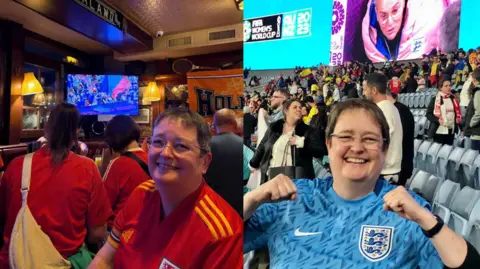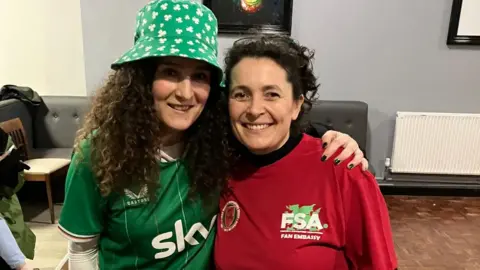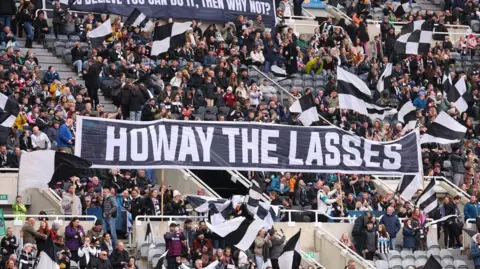Why some fans are backing both Wales and England
 Beth Whelan @talesbybeth
Beth Whelan @talesbybeth"It's our biggest rivalry and something we are so excited for."
Wales forward Hannah Cain is fully aware of the extra dimension that Wales taking on England in Sunday's key group D clash will bring.
Back in 2016, the last time the neighbouring countries faced off in a Euros tournament, Gareth Bale also put that rivalry into words: "It's like any derby - you never want to lose to the enemy."
But nine years on, with the women's teams meeting for the first time at a tournament, some fans have said they have no trouble supporting both teams come kick-off.
One fan put the difference in attitude and comparative lack of rivalry down to inclusivity within the women's game, although not everyone agrees.
Meanwhile experts said fans were more aware of the challenges women's teams had to face in order to play on the biggest stages.
Nicola Chapman, 54, is one of those fans cheering on both countries.
She is following the two teams in Switzerland and watched Wales' opener against the Netherlands, before seeing England take on the same opponents.
Originally from London, she came to Wales in 1999 and has remained ever since.
The honorary Welshwoman said even though she was England "through and through" when it came to football, her suitcase is split down the middle with England and Wales gear.
She said the inclusivity of the women's game made her feel able to cheer on both sides.
"You still get the banter between the both sides, but it does feel a lot more good natured. I think the big difference between the men and women's game is the inclusivity."
Come kick-off time, she will be donning Wales colours and singing along to the national anthem Hen Wlad Fy Nhadau, but added she might have to "sit on her hands" if England score.
 Nicola Chapman
Nicola ChapmanSiwan Davies, 20, from Bala, Gwynedd, said the rivalry between the two nations was "a joy to watch".
"There's nothing better than seeing two passionate countries battle it out against each other" she said, adding it was "fair" for some to support both nations and attributing that to the popularity of the Women's Super League (WSL).
"In my opinion it's down to the WSL, as so many English players play for their favourite club".
Ms Davies said she thought the rivalry would grow as the years go on and Wales improve, adding she hoped to see bigger attendances and more investment in the country.
 Siwan Davies
Siwan DaviesAlex Lloyd, 30, from Maesteg, Bridgend county, said she had an interest in football from a young age but "fell back in love" with it following England's appearance in the 2023 Women's World Cup in Australia.
"I support both Wales and the Lionesses, but being Welsh it's always important to show support to your home nation in major tournaments," she said.
"Women's football is evidently bigger in England than it is Wales but hopefully with Wales being in their first major tournament it will open the game up to young girls across the country.
"The success of recent tournaments for the Lionesses and the overall quality of their players draws me to them."
She said she enjoyed football when she was younger, but the women's game was not shown or spoken about as much as today, with a lack of idols.
"It was mostly known as a boys or men's sport and it was always the male footballers we would want to be like," she said.
She said it was "incredibly special" to see young girls being part of women's teams, and praised the likes of Beth Mead for speaking openly about the loss of her mum, something Alex also experienced at a young age.
Dr Penny Miles, lecturer and researcher into fan culture at the University of Bath, said there was "feminist solidarity" in the women's game.
"The conditions female players have had to face both sides of the border means a lot more solidarity," she said.
"Whilst the English FA is quite ahead of the Welsh FA in terms of investment, the conditions, professionalisation, didn't really come into place until 2019 really.
"The fans have seen the challenge all these women have had to face, I think that makes you want to support women's football, irrespective of where they come from."
Dr Miles said she had seen Chile and Argentina fans supporting each other during the 2019 World Cup, despite them generally being seen as big rivals.
 Dr Penny Miles
Dr Penny MilesBut is it fair to say this camaraderie between rival fans is confined to the women's game?
Prof Stacey Pope, from Durham University, found football fans in the north-east of England would regularly watch rival teams as part of their own research dating back to the 1950s.
"Modern fans may find it hard to believe, but many Newcastle United fans would watch Sunderland," she said.
Prof Pope added the rise in coverage around the women's game since 2015 had helped bring a new wave of fans.
"Increased visibility and increased media coverage opens it up to supporters across the board and one of the key things from that research was that that kind of respectful coverage and the amount of coverage has also led to shifts and changes in attitudes," she said.
"Which can actually lead to to shifts in terms of moving from sexist and misogynistic attitudes to more progressive attitudes. That's been something that's been really positive in terms of the increased media visibility."
There has been a 45% increase in participation in women's football in Wales since 2021, while the number of women and girl's teams in England has doubled in the past seven years.
 Ed Sykes/The FA/Getty Images
Ed Sykes/The FA/Getty ImagesBut not everyone will be rushing to buy half-half scarfs for Sunday.
Lianne Mitchel, 35, from Cardiff said she could not "understand how anyone could be fans of both" and added "there is a definite rivalry" which "will show on the pitch".
Hayley Clarke, from Bangor, Gwynedd, started following the Lionesses games when she got into football during the 2019 World Cup.
But she said she would "never" support England over Wales.
This Welsh team will forever be known as history makers, regardless of who you will be supporting on Sunday.
